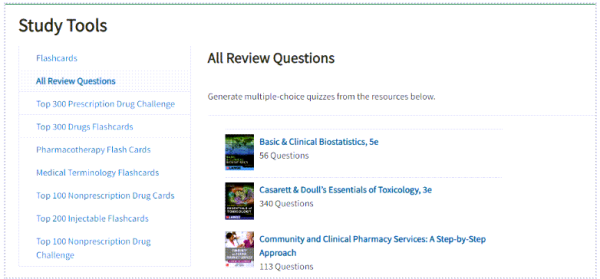
No Comments on Review Update: AccessPharmacy 101
Amy Castro, MLIS
Access Services & Instruction Librarian
Touro University California
This is an update of a review published in the 09/16 issue of Doody’s Collection Development Monthly. You can find the original review here.
AccessPharmacy is an online resource with books, multimedia, cases, a drug database, interactive self-assessment, and board review to support pharmacy curriculum and education.i It is published by McGraw Hill and is one of 25 sites on the McGraw Hill Access platform that also includes AccessMedicine, AccessCardiology, and the Case Files Collection, to name a few.
Content
AccessPharmacy is an online resource that supports pharmacy education using textbooks, study aids, and cases that cover most areas of pharmacy curriculum including the basic sciences, pharmacology, medicinal chemistry, pharmacy management, and laws and ethics. The intended audience is pharmacy students, pharmacy educators, and practicing pharmacy professionals. The resource also includes an integrated drug database and patient education handouts that can be modified with logos and personal messages. Pharmacy educators may also request access to additional instructional materials including answers to cases, SOAP notes, activities, quizzes, and PowerPoint slides.i

[AccessPharmacy Homepage, February 12, 2024, McGraw Hill]
The content is easily accessible using the search bar or from the horizontal navigation bar with the following links: Books, What’s New, Blog, Quick Reference, Drugs, Multimedia, Cases, Study Tools, NAPLEX Central, Patient Education, and For Instructors. A mobile app is also available for iOS and Android. Some features like flashcards, review questions, and NAPLEX board review require institutional users to register for an Access account that will work on any McGraw Hill Access site to which they have access.
There is a three-member advisory board consisting of Editor-in-Chief Terry L. Schwinghammer, PharmD, and Associate Editors Joseph T. DiPiro, PharmD, and Shane Desselle, RPh, PhD; all three are recognizable names in pharmacy education and authors of texts published by McGraw Hill.ii
Features/Functionality
AccessPharmacy has a basic search bar at the top of the website that can be searched with keyword, title, author, or ISBN. An advanced search option is no longer available, but once a search is completed, users can further modify their search by applying filters and using the query builder where additional search terms can be added. The search engine offers search suggestions as users type; this is a nice feature for users to customize the search function based on personal preference. In several test searches, the suggestions offered were relevant to the intended search. There is an option to enable and disable autosuggest.
To the right of the search box is an “About Search” link for a page explaining search results ranking, filters available, and how to search across all McGraw Hill Medical sites.iii On the search results page, there is an option to expand the search across all McGraw Hill Medical sites. The search results page for this federated search indicates what content is accessible with a small green dot next to each result. Users can also navigate to other McGraw Hill Access sites by going to the drop-down navigation menu at the top left of the website to view Available Sites (sites to which a user has access) or Explore More Sites (no access).
The “Access User Center” can be found by clicking on “Support” at the top and selecting “Training & Support.” The “Access User Center” has resources for all McGraw Hill Access sites, but users can easily filter to AccessPharmacy to find help including FAQs, videos, and promotional materials for both the end users and librarian administrators of AccessPharmacy.

[AccessPharmacy Homepage, February 12, 2024, McGraw Hill]
There are currently 85 books on AccessPharmacy, 69 of which are unique titles, and the remainder are previous editions. New editions are regularly published and updated on AccessPharmacy. Several titles, including DiPiro’s Pharmacotherapy: A Pathophysiologic Approach, Harrison’s Principles of Internal Medicine, and Goodman and Gilman’s The Pharmacological Basis of Therapeutics are even updated in between editions. The textbook interface makes it easy to navigate to different chapters in the table of contents. Features are also shown to the right side of the book’s table of contents, recommending relevant videos or lectures to study along with reading the text.
One quality that makes AccessPharmacy exceptional is the platform’s interactivity. Not only are there tools to improve studying, but there are also opportunities to interact with authors and others in the pharmacy education community.
AccessPharmacy has many interactive self-assessments under the “Study Tools” dropdown menu. Review questions and flashcards are popular with students as a supplemental study tool and with faculty who may integrate it into their courses. For review questions, users can create customized quizzes for the content they are currently covering. The flashcards can be sorted alphabetically, by drug class, or by quiz categories; flashcards can be marked as favorites to make it easy to return to topics that need further study.

[AccessPharmacy Study Tools Page, February 12, 2024, McGraw Hill]
Another new feature since the previous review is the NAPLEX Central tab. It includes practice exams with over 2,000 questions, books, and videos available. Users can take a timed practice exam and see a report with a breakdown of areas of strength, weakness, accuracy, speed, and how their answers compare to others on AccessPharmacy. The NAPLEX Question of the Week is another opportunity to engage users with NAPLEX board prep in just a few minutes and gives an in-depth explanation of the answer. Students can also interact with the author of these NAPLEX Questions of the Week.
More Patient Care Process videos and videos on patient education could be added. The “Patient Education” tab currently only has PDFs of patient education handouts. Review questions for the texts can also be improved — while a brief explanation of the answer is provided, it would be useful to have a hyperlink to the relevant page in the textbook so students can re-read content for questions they answered incorrectly.
Business Model
Both individual and institutional licenses are available for AccessPharmacy. Individual subscriptions are offered as a one-year license at a price of $595.00 per year.iv Individual subscribers use a MyAccess account to purchase and access the database.
Pricing information for institutions is not available on the website and can be requested via a “Contact Us” webform. Touro University California Library’s institutional subscription pricing is based on the full-time student enrollment numbers in our pharmacy program. Institutional authentication methods include IP authentication, referring URL/domain, Shibboleth, SAML, and EZproxy. When other options are not available, institutions can use token authentication.v Some features, including NAPLEX Central and many study tools, require institutional users to create a free MyAccess profile on top of their institutional login for access to the site. Individual users already have a MyAccess profile created at the time of their purchase.
Usage data can be found on McGraw Hill Medical’s SiteManager admin portal. COUNTER R5 Reports and McGraw Hill’s proprietary Activity Reports are available on this site with an administrator login.vi There are also usage reports available for the Access app.vii
Breakthrough
Academic libraries that support pharmacy programs should consider a license to AccessPharmacy for access to the McGraw Hill Medical books and self-assessment and study tools. The AccessPharmacy site is frequently updated with the most current textbook editions, new information, and new and improved features, such as the new Patient Care Process videos and NAPLEX Question of the Week. As a pharmacy librarian responsible for collection development, I appreciate that the most recent editions of McGraw Hill books will be available on AccessPharmacy without me having to track publication dates or orders; the previous edition is also still available for any current courses that are using it.
Students at my institution are enthusiastic about the study tools in AccessPharmacy and especially appreciate the Top 300 Prescription Drug Cards, Top 100 Nonprescription Drug Cards, and Top 100 Nonprescription Drug Challenge. AccessPharmacy regularly adds new features or updates information, so there is always something new to learn.
References
i. Accessed 2/3/2024: https://accesspharmacy.mhmedical.com/instructorresource.aspx
ii. Accessed 2/3/2024: https://accesspharmacy.mhmedical.com/ss/AdvisoryBoard.aspx
iii. Accessed 2/3/24: https://accesspharmacy.mhmedical.com/ss/aboutSearch.aspx
iv. Accessed 2/7/24: https://store.mhmedical.com/index.aspx
v. Accessed 2/7/24: https://www.accessusercenter.com/posts/institutional-customer-authentication-methods
vi. Accessed 2/3/24: https://www.accessusercenter.com/pages/Pulling-Usage-Statistics
vii. Accessed 2/7/24: https://www.accessusercenter.com/documents/librarian-and-admin-faqs


Leave a comment